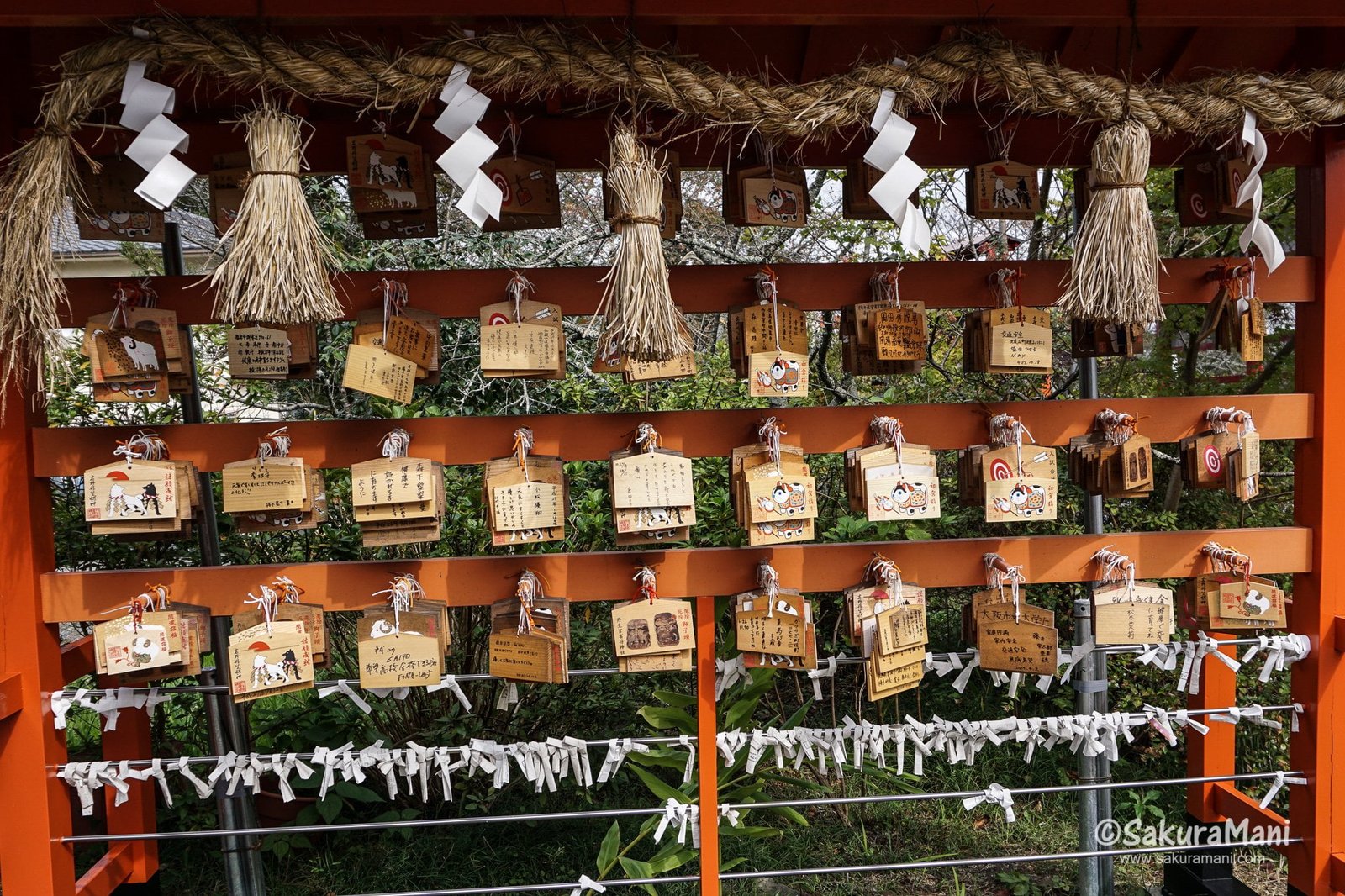朱 cinnabar 訓読み:あけ 音読み:シュ 例文:朱色(しゅいろ vermilion) 珠 gem 訓読み:たま 音読み:シュ 例文:珠算(しゅざん abacus)、真珠(しんじゅ pearl)、珠玉(しゅぎょく jewel) 殊 especially 訓読み:こと 音読み:シュ 例文:特殊(とくしゅ speciality) 株 stock 訓読み:かぶ 音読み:シュ 例文:株式(かぶしき stock)、株主(かぶぬし stock holder)、貸し株(かしかぶ lending stock) 菜 vegetables 訓読み:な 音読み:サイ 例文:野菜(やさいstock)、総菜(そうざい side dish)、菜食主義(さいしょくしゅぎ vegeterianism) 採 adoption 訓読み:とる 音読み:サイ 例文:採用(さいよう employment)、採択(さいたく selection)、採算(さいさん profit) 彩 to colour 訓読み:いろど.る 音読み:サイ 例文:色彩(しきさい colours)、多彩な(たさいな colourful) 磨 polish 訓読み:みがく 音読み:マ […]
Articles
The importance of Ema in Japan
What is ema? Those cute wooden votive plaques hanging outside a shrine or a temple are called ema. People tie ema for two reasons – when they are praying for something or when their wish comes true. Ema usually come with painted pictures and people just written down wishes on them before tying them up. But why its called an ema? Ema […]
The Cherry Blossoms of Hikone and Nagahama
Almost 13 kilometres away from the overflowing cherry blossom parks of Kyoto stands an elegant white castle on top of a small hill in Shiga prefecture. Surrounded by a wide moat and a thick stone wall, Hikone castle is one of the 12 original castles still remaining in Japan. I set out for Hikone from Nara to view […]
The Four Seasons of Wakakusayama
Nara, the ancient capital of Japan is best known for its temples more than anything else. Most visitors come here to pay homage to the great 大仏 daibutsu (Buddha) of Todai-ji and have fun at Nara deer park. If you wish to move away from the crowd and experience Nara’s wild beauty, you should hike […]
JLPT N1 Kanji Lesson 9
士 samurai, gentleman 音読み:シ 例文:武士 (ぶし warrior)、同士(どうし companion)、弁護士(べんごし lawyer)、博士(はくし doctorate) 志 aspire, intent 訓読み:こころざし 音読み:シ 例文:志向 (しこう intention)、志を果たす(こころざしをはたす realise one’s aspiration)、志望(しぼう desire) 氏 family name, title (example: Mr oo) 訓読み:うじ 音読み:シ 例文:氏名 (しめい full name)、彼氏(かれし boyfriend)、氏神(うじがみ patron god) 凶 disaster 音読み:キョウ 例文:凶作 (きょうさく bad harvest)、凶暴(きょうぼう atrocious) 囚 arrest 訓読み:とらわれる 音読み:シュウ 例文:囚人 (しゅうじん prisoner)、捕囚(ほしゅう captured) 尺 scale, length […]
JLPT N1 Kanji Lesson 8
丁 street 訓読み:ひのと 音読み:チン・テイ・チョウ・トウ・チ 例文:丁目 (ちょうめ ward/block)、丁寧(ていねい polite)、丁度(ちょうど exactly)、符丁(ふちょう code/cipher) 刀 sword 訓読み:かたな・そり 音読み:トウ 例文:刀剣 (とうけん sword)、木刀(ぼくとう wooden sword)、竹刀(しない bamboo/fencing sword)、薙刀(なぎなた long sword)、刀工(とうこう swordsmith) 及 to reach/as well as 訓読み:およぶ・および 音読み:キュウ 例文:普及 (ふきゅう spread)、及ばず(およばす exert) 己 self/serpant 訓読み:おのれ・つちのと・な 音読み:キ・コ 例文:自己 (じこ self)、利己(リコ self-interest) 弓 bow 訓読み:ゆみ 音読み:キュウ 例文:弓矢 (ゆみや bow and arrow)、弓形(ゆみなり arched shape)、弓道(きゅうどう archery) 矢 […]
JLPT N1 Kanji Lesson 7
護 safeguard 訓読み:まもる 音読み:ゴ 例文:護衛(ごえい guard)、防護(ぼうご protection)、看護(かんご nursing)、保護(ほご care, patronage)、弁護士(べんごし lawyer) 譲 to hand over 訓読み:ゆずる 音読み:ジョウ 例文:譲渡(じょうと transfer)、譲歩(じょうほ conciliation) 謙 to be modest 音読み:キョ 例文:謙虚(けんきょ modesty)、謙譲(けんじょう humility) 謹 respectfully 訓読み:つつしむ 音読み:キン 例文:謹賀(きんが wishes of happiness)、謹慎(きんしん penitence) 謀 to plot 訓読み:はかる 音読み:ム・ボウ 例文:共謀(きょうぼう conspiracy)、陰謀(いんぼう conspiracy)、参謀(さんぼう to participate in planning) 謝 to apologise 訓読み:あやまる 音読み:シャ 例文:感謝(かんしゃ […]
How did Hiragana and Katakana originate?
If you have started learning Japanese, you might have heard by now that there were no written scripts in Japan until Kanji were introduced from China. In early Japan, people only communicated verbally and once kanji were introduced in the 5th century, chronicles, stories and poems emerged in the written form. Soon Hiragana and Katakana scripts […]
Finding India in Japan
I am talking about that feeling you get when you are walking down the streets of a foreign land and then suddenly you spot something that is connected to your motherland. It could be a restaurant that serves your country’s cuisine or a handicraft store that sells items imported from your country or anything else […]
13 Japanese words that are used in English
Even if you do not speak Japanese, you might be using Japanese words in your daily life without even knowing. Have you heard of the term ‘loanwords’ or 外来語 (gairaigo)? According to the online Oxford Dictionary, a loanword is “a word adopted from a foreign language with little or no modification“. Japanese language has contributed many […]





